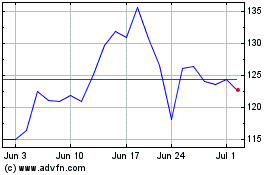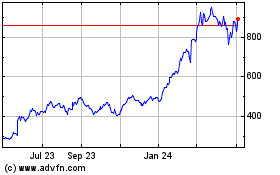Nvidia Arms Up for Trouble -- Heard on the Street
September 14 2020 - 5:29AM
Dow Jones News
By Dan Gallagher
Forty billion dollars will buy Nvidia a world-class
semiconductor research and licensing business. It might also buy
the rapidly ascending chip maker a whole new kind of trouble.
Nvidia confirmed Sunday that it would pay $40 billion to acquire
Arm Holdings from SoftBank. The deal, which has been churning
through the rumor mill for several weeks, is Nvidia's largest by
miles, nearly six times as large as last year's acquisition of
Mellanox. Fortunately, Nvidia's gravity-defying stock makes for
valuable currency. The company is kicking in only $12 billion in
cash, just a little above what was on its balance sheet as of two
months ago.
But the main risk to this deal was never financial. U.K.-based
Arm provides the basic designs for the low-power central processor
chips that form the main brains of devices such as smartphones and
tablets. Companies including Apple, Samsung and Qualcomm license
those designs for their own chips. The upshot is that nearly every
company that makes processors for mobile devices and other types of
chips has a licensing relationship with Arm. And a lot of those are
chip makers that either compete with Nvidia, or are likely to in
the future.
As such, Nvidia will need to strike a delicate balance between
running its own chip business and allowing Arm's a certain degree
of independence--all while trying to fully realize the value of its
$40 billion outlay. Both companies realize this. Nvidia Chief
Executive Jensen Huang said Sunday that he plans to fully maintain
Arm's "open licensing and neutrality," while Arm CEO Simon Segars
added that it would be "value destructive to do anything else."
But that is easier said than done. Qualcomm's efforts to run
both a chipset and licensing business have enmeshed the company for
years in lawsuits and battles with regulators. And Nvidia's
strength in artificial-intelligence computing that has made the
company a Wall Street darling also makes it the name to beat for
others targeting this lucrative field. In a note to clients Sunday
night, Stacy Rasgon of Bernstein said Nvidia's "dominance will be
extended into virtually every important compute domain" if it can
complete this deal.
Therefore, even completing the deal is a big "if." The
acquisition will need the approval of regulators across the globe.
That includes the U.S. and China, where semiconductors have become
a battleground in an escalating trade and technology war. It took
Nvidia more than a year to push through its relatively
uncontroversial acquisition of Mellanox. Mr. Huang wouldn't even
put a rough guess on how long it would take to get the necessary
signoffs for buying Arm. The chance of a long, drawn-out battle for
approvals is high.
And the real risk for Nvidia is that getting the world's biggest
governments on board may turn out to be the easy part. If the
company can't find the right balance between reassuring Arm's
licensees and making the most of its investment, the real winners
from this deal could be the lawyers.
Write to Dan Gallagher at dan.gallagher@wsj.com
(END) Dow Jones Newswires
September 14, 2020 05:14 ET (09:14 GMT)
Copyright (c) 2020 Dow Jones & Company, Inc.
NVIDIA (NASDAQ:NVDA)
Historical Stock Chart
From Mar 2024 to Apr 2024

NVIDIA (NASDAQ:NVDA)
Historical Stock Chart
From Apr 2023 to Apr 2024
